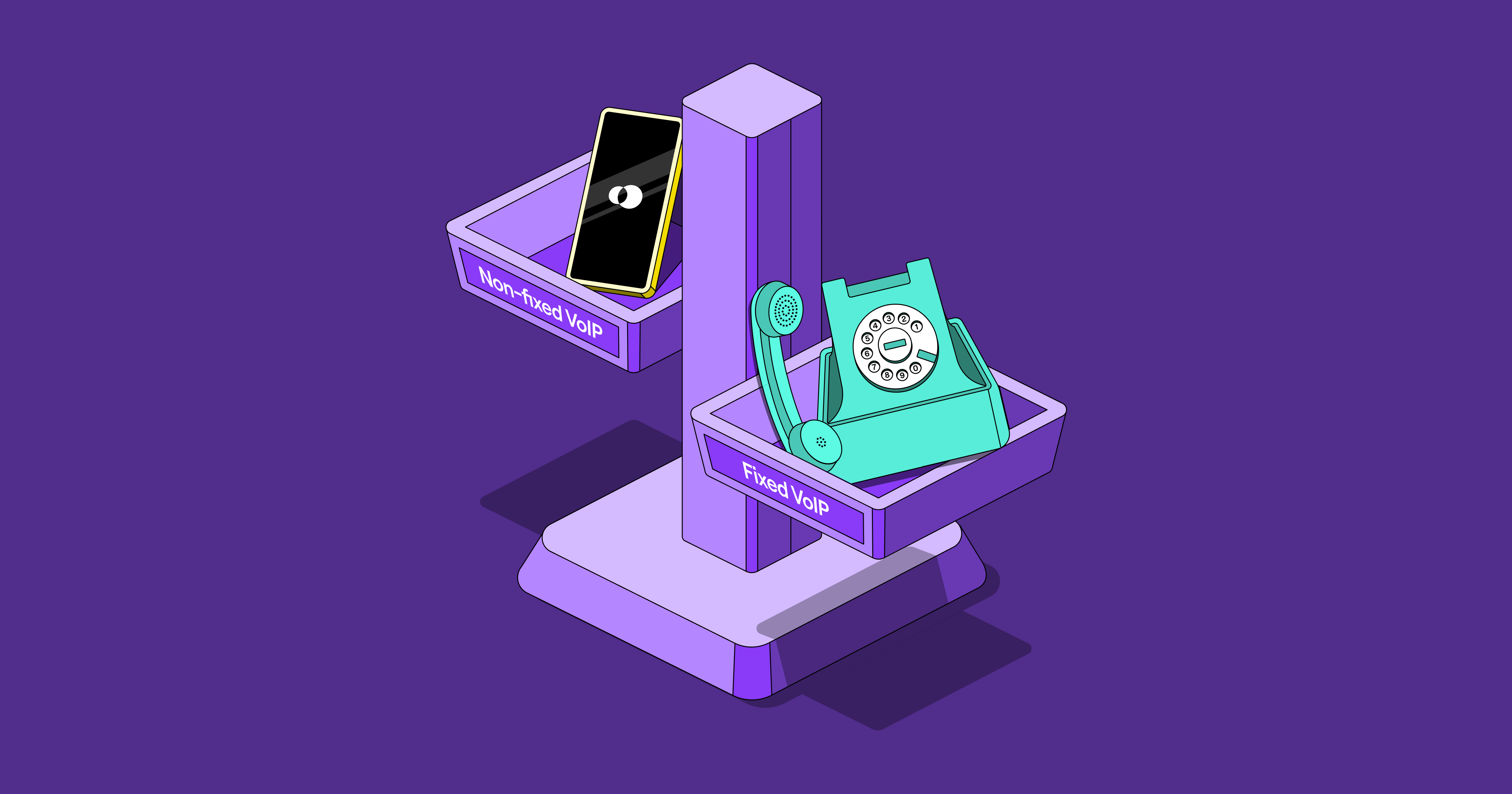Wondering what a non-fixed VoIP phone number is?
A non-fixed VoIP phone number is a virtual number that’s assigned to a specific user, usually based on their email address, instead of to a physical phone line. This means you can access your phone wherever you can log into your account. As long as you have an internet connection and a device that’s compatible with your VoIP service provider‘s app, you can make calls from your phone number.
Your business doesn’t need a physical address to access non-fixed VoIP numbers. Since these virtual phone numbers are cloud-based, rather than location-based, your team can claim and use numbers with pretty much any area code — from almost anywhere around the world.
Read on to learn more about how non-fixed VoIP phone numbers work, their key benefits, and the top non-fixed VoIP provider.
How does non-fixed VoIP work?
Non-fixed VoIP exclusively uses the internet to connect you to phone calls.
When you make a non-fixed VoIP call, your phone service converts your audio into data packets, which travel over the internet to your call recipient before they’re translated back into audio.
Callers won’t be able to tell if they’re calling non-fixed, fixed VoIP lines, or even a landline. Since the flow of data happens in real-time, the calling experience is exactly the same for your clients.
How does non-fixed VoIP compare to fixed VoIP?
Like a traditional landline phone, your VoIP phone number is assigned to a physical location using a fixed VoIP service. They often use the public switched telephone network, or PSTN. This means your business needs a physical location to have a fixed VoIP number. Plus, you’ll only be able to use the local area codes of cities where you have a physical presence, just like with old-school landlines.
The perk of getting tied to a physical address is you can use your number to call emergency services. However, for everyday business usage, fixed VoIP can be an expensive hassle. For instance, if you’re a solopreneur in the US but want a Canadian phone number, you’ll have to invest in an office up in the Great White North — or you can simply opt for a non-fixed VoIP phone.
Unlike a traditional landline phone, non-fixed VoIP exclusively uses the internet to connect you to phone calls.
Pros and cons of fixed VoIP solutions
A fixed VoIP system will assign you a local number based on your business address. There can be advantages to using a fixed VoIP solution if you’re building a business with one regional office. But it’s not a great option if you have offices in multiple locations, remote teams, or a need for private communication. If you’re deciding between non-fixed VoIP vs fixed VoIP solutions, Let’s dive deeper into the benefits and disadvantages of fixed VoIP options.
Pros of fixed VoIP solutions
1. Advanced calling and routing features
Fixed VoIP systems include advanced calling and routing capabilities like hunt groups, multi-digit extensions, and call forwarding. These features can optimize call flow and increase efficiency for businesses with one physical location, such as a local real estate agent’s office.
While these features can improve business communications, they often come with additional costs. What’s more, many non-fixed VoIP platforms offer the same solutions at a lower price.
2. Identifiable on caller ID
With a fixed VoIP system, your business number is tied to a specific location, which means it’ll have caller ID. Having your number show up on caller ID can boost credibility with clients.
Your customers may not have your number saved in their contacts. When clients can easily identify you, they’ll answer instead of mistaking your call for a spammer and letting it go to voicemail.
3. Emergency services
With a fixed VoIP solution, you can call emergency services since the number is tied to a physical location.
Cons of fixed VoIP solutions
While fixed VoIP solutions have some benefits and may be a great fit for small, local businesses, the cons may outweigh the pros. Here are a couple of downsides to fixed VoIP providers.
1. Not scalable
Fixed VoIP numbers are more challenging to scale than non-fixed ones because the numbers are linked to one location. With a fixed VoIP system, all numbers will be tied to your headquarters. You’ll need another physical address if you wish to establish a presence outside your city or country, which can be time-consuming and expensive to set up.
2. Requires hardware
Most fixed VoIP solutions require SIP trunks and other physical hardware, making them more expensive to set up than non-fixed VoIP solutions.
Plus, international calls are expensive when they come from a local number. You’ll be paying for international calls by the minute, which adds up in the long run. Additionally, international calling rates are subject to change without warning.
So, what are the pros and cons of non-fixed VoIP solutions?
Non-fixed VoIP numbers = virtual phone numbers. You get it. So what’s the big deal? While going fully digital may seem unnecessary — especially if you’re already using a fixed VoIP service or working from a company office — it can offer enormous benefits to any business, even if your team isn’t remote.
Here are four perks of getting a non-fixed VoIP phone number, as well as some potential drawbacks to consider.
Pros of non-fixed VOIP solutions
1. Communicate remotely
Modern businesses are increasingly moving away from traditional office environments. Remote work is becoming a norm — and even companies with offices commonly use a hybrid model, have employees that travel for work, or serve customers beyond their local area. A fixed phone system is far too limiting for remote teams with clients around the world.
A non-fixed VoIP system gives you the flexibility to make calls anywhere you or your clients are — typically with far lower rates for international calls to reach folks outside the US or Canada.
2. Build a local presence in multiple cities
When you’re not tied to a physical location, you can choose local numbers from practically any city. If you have customers in New York, you can call locals with a familiar 212 area code instead of a distant Miami area code.
As you expand your business, you can easily sign up for more phone numbers with different area codes.
3. Keep your personal number private
When you use your personal phone number for business, it can appear on your public records and online business listings. Your phone may endlessly ring due to scam calls, robocalls, and clients with “urgent” matters. And if you don’t want to mute calls from your loved ones, you won’t be able to stop those calls from coming in.
A non-fixed VoIP number allows you to have separate phone numbers for personal use and business use on the same phone, so you can keep your personal number private and prevent yourself from accidentally taking a work-related call late in the evening.
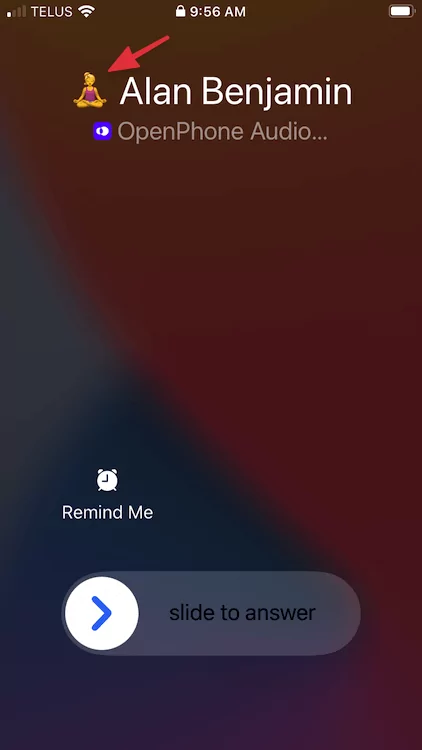
Best of all, you can always tell when incoming calls are work-related and still be able to take those calls from your existing smartphone as a second phone number.
4. Simplify setup
Non-fixed VoIP phone numbers are the simplest type of number to obtain. Signing up for an account and accessing your first number is a lot like signing up for any other business app. Without the need to deal with on-premises hardware or traditional phone lines, you can complete the signup process within minutes without paying for professional help.
Cons of non-fixed VoIP solutions
While most businesses benefit from choosing a non-fixed VoIP solution, there are a few drawbacks.
1. Requires strong internet
With non-fixed VoIP systems, call quality depends on your internet connection and power source. If you live somewhere prone to power outages or have slow internet, you could experience issues like lag, jitter, or dropped calls.
To mitigate this, look for a VoIP provider with a good uptime history and invest in the best internet connection possible.
2. Credibility concerns
Since virtual numbers aren’t tied to a physical address, caller ID can’t identify them. In some cases, customers might confuse your number with a spammer.
Don’t worry, though. OpenPhone users can set up their own outgoing caller ID, eliminating this concern.
5-step process for finding the right fixed or non-fixed VoIP provider
Choosing the right virtual phone system (fixed or non-fixed VoIP) for your business depends on your unique requirements, such as your number of offices, your need for international calls, and whether your team is in-house or remote.
Your decision will also depend on whether or not you need to communicate across devices and locations. For example, do you need to make and receive local calls only, or do you have a remote team that needs access to calling and texting?
Here’s a step-by-step process to help you identify your needs and select the right business phone system:
1. Confirm what types of phone numbers you need
If you’re a local business, you may only need a local number customers can easily identify.
With a non-fixed VoIP like OpenPhone, you get a local number for free and can set up caller ID. The only instance where you’d need a local number from a fixed VoIP would be if you need to contact emergency services from your business phone.
Additionally, consider whether or not you need a North American toll-free number. A toll-free number gives your customers located in any countries or regions part of the North American Numbering Plan a free way to contact you.
2. Estimate the number of users
Determine how many people will be using your business phone solution. If your team is expanding, you’ll need a scalable business phone system you can adjust as you grow.
You’ll also need a phone system where everyone on your team can make and receive calls — no matter where they’re located. A fixed VoIP works for one-location teams, whereas a non-fixed is best for remote and multiple-office teams.
As you count how many people will be using your system (now and in the future), look closely at how much VoIP costs increase to add additional users to your business phone plan. Some providers can get costly as you add users.
3. Identify key features needed
There are plenty of fixed and non-fixed VoIP solutions, but not all are created equal. Scour the features sections of different business phone solutions and see which ones suit your needs best.
At a minimum, you should look for a system that offers shared numbers, conversation threads, call recording, and an auto-attendant for call routing.
4. Shortlist the best options
Read guides to get an idea of the best VoIP software options. These guides provide side-by-side comparisons of features, pricing, and benefits to help you make the right choice.
Once you’ve read several guides, browse review sites like G2 or Capterra. User reviews and ratings on these sites reflect real-world experiences and recurring issues that come up for other businesses, helping you further narrow down your choices.
5. Trial the providers on your shortlist
Once you’ve identified your top VoIP providers, sign up for their free trials. This will give you an inside look at your potential VoIP provider.
Note user-friendliness, customer support, onboarding, and compatibility with your current tech stack. Ask your team members which platform they liked best and which would make their jobs easier.
Now you should have your provider picked out — congrats! If you want to use an existing number after doing a few trials, it’s easy to port it over to OpenPhone.
Why OpenPhone is the best non-fixed VoIP provider
Choosing the right non-fixed VoIP solution can require plenty of research and comparison, but we like to think OpenPhone makes it easy for clients to choose our service. While all non-fixed VoIP providers can offer the benefits we listed above, OpenPhone offers a large number of additional perks few other business phone systems provide.
1. Easily add teammates and new numbers as you scale
When your business grows, you’ll inevitably need to hire — and often, that means you need to purchase more phone numbers, too. OpenPhone makes the process simple. With a few taps and a small increase to your monthly payment, you can invite new members via email and simultaneously assign them to new or existing telephone numbers.
If you ever need more numbers than you have users, you can quickly add a business line for $5 per month.
2. Effectively collaborate on communications remotely
Working together is as important for a remote team as it is for a traditional one. OpenPhone is built to support collaboration, so you won’t miss yelling to coworkers over a cubicle.
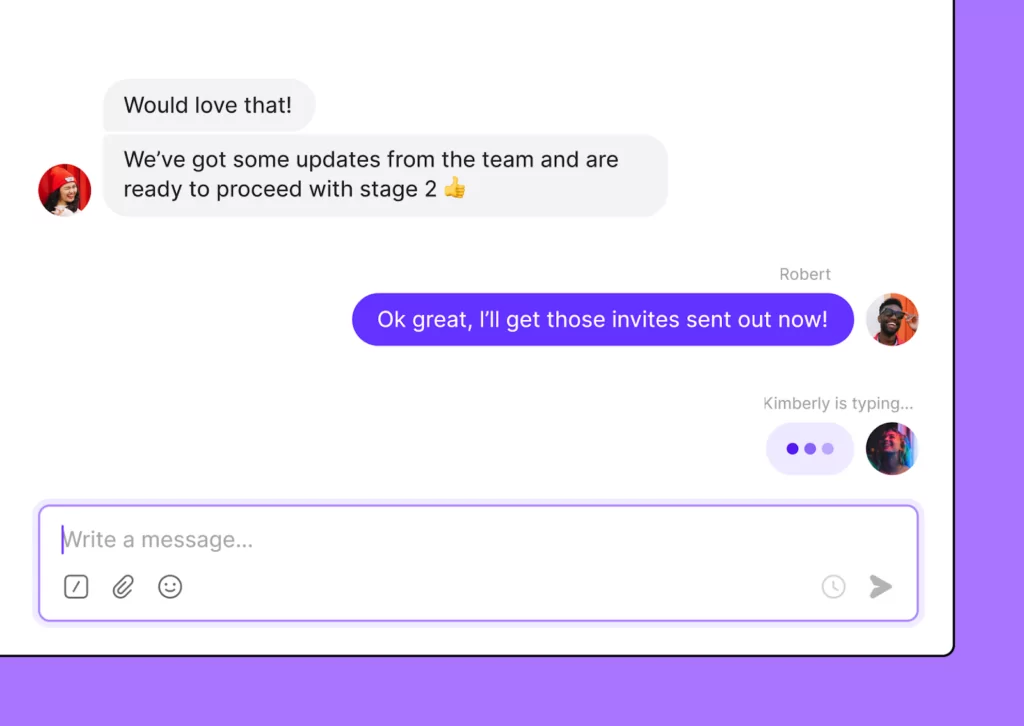
Our non-fixed VoIP system allows unlimited team members to share phone numbers and visually see when coworkers are already typing or on a call. Teams can assign a ring order to handle calls more effectively, as well as do group calling (also known as three-way calling) with warm transfer and hold options. You can also share contacts and add custom properties with additional context for each relationship, so your clients get a positive, consistent experience anytime someone on your team helps them out. 🙌
3. Access US, Canadian, and toll-free numbers
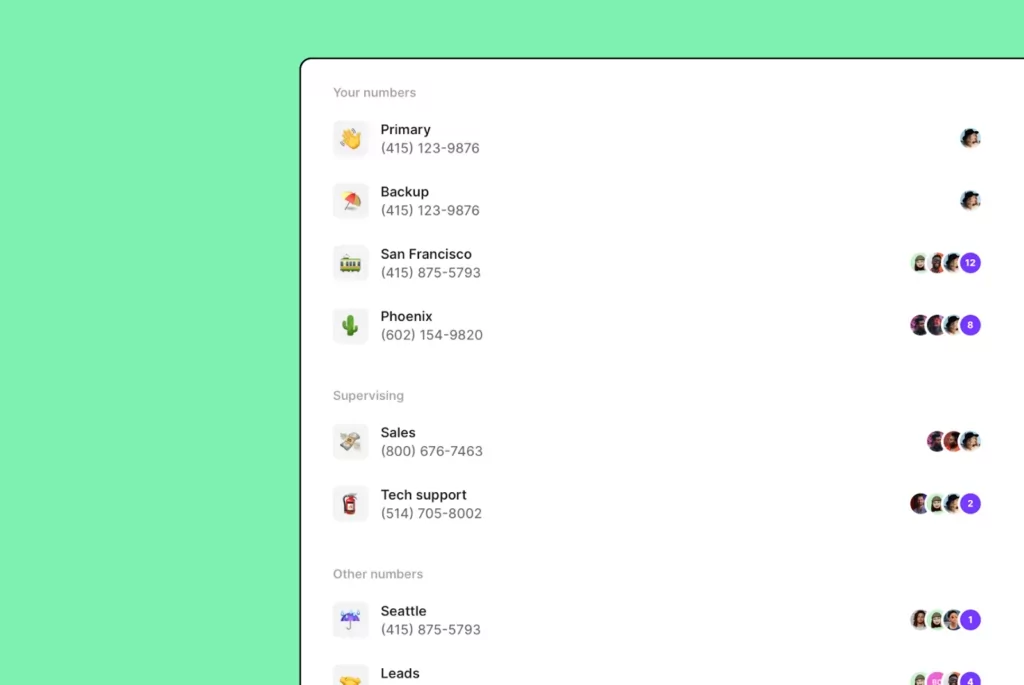
Most popular non-fixed VoIP providers offer local US numbers, but growing an international presence may prove more difficult. With OpenPhone, you have far more options that can lend a hand in your expansion. You can access Canadian and US phone numbers — and make unlimited free calls and texts to either country. You can also get toll-free numbers, which allow clients throughout North America to call you for free.
4. Save time communicating with your business contacts
If you want to boost your company’s efficiency, you need business phone functionality that helps your team work smarter, not harder. OpenPhone helps you save time through automation by allowing you to set auto-replies for missed calls, voicemails, or texts and create text message templates called snippets.
OpenPhone also offers integrations with popular business apps like HubSpot, Slack, Zapier, and email. This way, you don’t have to constantly hop between apps to benefit from them.
Improve your business communication with OpenPhone
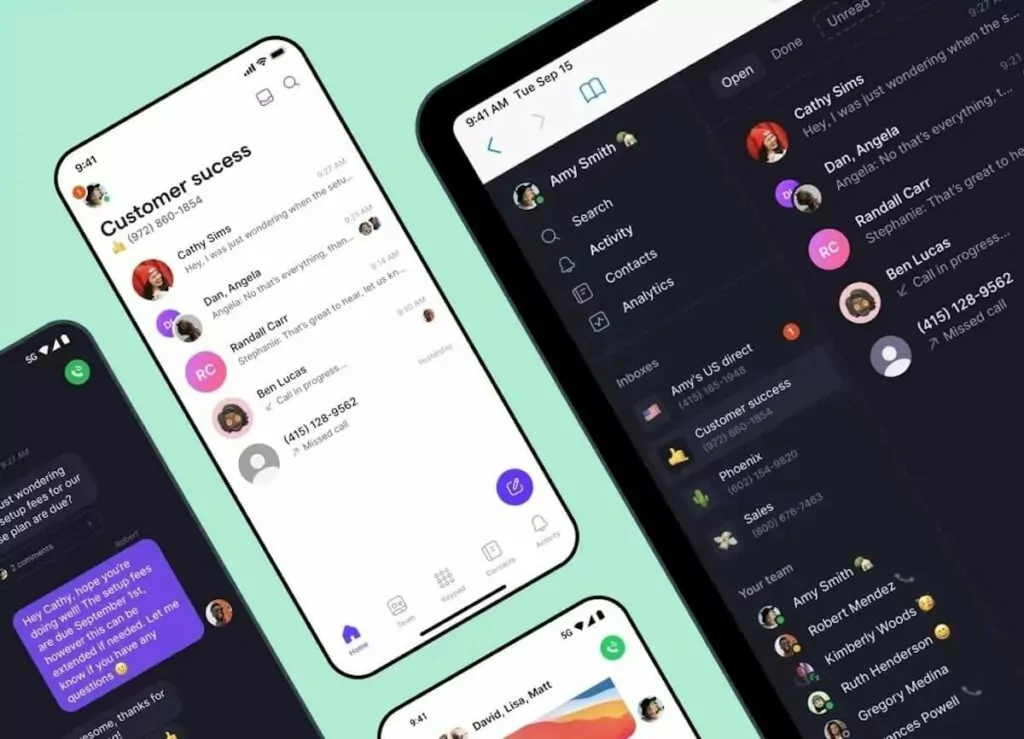
Opting for non-fixed VoIP phone numbers for your business allows you to easily expand your team globally and reach an international clientele. Plus, it’s simpler to set up and a great way to keep your business calls separate from your personal ones. With OpenPhone specifically, you can streamline your business processes and make your team’s collaborative efforts smoother than ever — even if your whole team is remote. Start your free, seven-day trial of OpenPhone.
Non-fixed VoIP FAQ
Yes. Clients can call your non-fixed VoIP number just like they would a traditional phone number.
Yes. As long as your non-fixed VoIP service supports text messages (OpenPhone supports both SMS and MMS), your clients can text your number.
You can trace a non-fixed VoIP number, but not always back to the correct caller, which is why they’re sometimes used for fraudulent activity. Since non-fixed numbers aren’t linked to a geographic location — which allows the use of them on different devices or reassignment to new VoIP users — call tracing can prove difficult and imperfect. (Of course, nobody likes a spammer.)
A non-fixed VoIP phone is not a cell phone, but you can use it on your cell phone. Non-fixed VoIP phones are fully virtual phones that you can access through apps on any compatible device. OpenPhone offers desktop, web, and mobile apps.
A non-fixed VoIP number lets you initiate and receive calls from different devices, including your laptop, computer, smartphone, or tablet. This allows you to take and receive calls from anywhere with just one phone number. Are you living overseas for a few months? With a non-fixed VoIP number, you won’t miss out on any calls.
Non-fixed VoIP relies solely on the internet for call connectivity, converting audio to data packets, which are then sent to the recipient and reverted to audio. Due to real-time data transmission, the calling experience is indistinguishable from fixed VoIP or landline calls.
